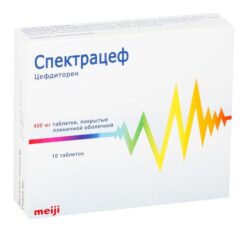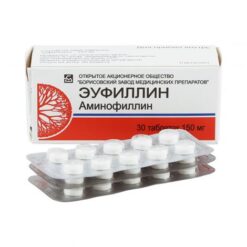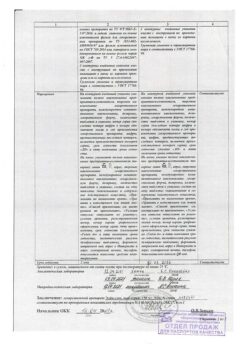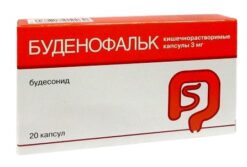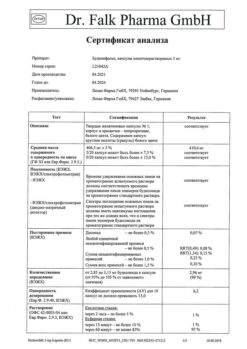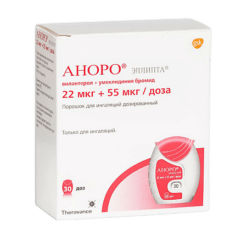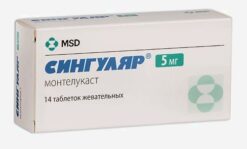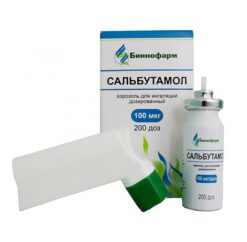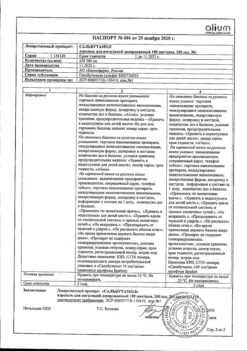No products in the cart.
Sibri Brizhaler, 50 mcg blisters 30 pcs
€52.56 €43.80
Description
Sibri Brizhaler (glycopyrronium bromide) is a long-acting anticholinergic bronchodilator for the treatment of COPD.
The results of studies show that glycopyrronium bromide effectively improves lung function, reduces the severity of COPD symptoms and reduces the frequency of exacerbations.
Glycopyrronium bromide starts working within 5 minutes after intake, is well tolerated, and provides a bronchodilator effect lasting 24 hours.
Indications
Indications
Maintenance therapy for bronchial conduction disorders in patients with chronic obstructive pulmonary disease.
Pharmacological effect
Pharmacological effect
Sibri Breezhaler (glycopyrronium bromide) is a long-acting anticholinergic bronchodilator indicated for the treatment of COPD.
According to research results, glycopyrronium bromide effectively improves lung function, reduces the severity of COPD symptoms and reduces the frequency of exacerbations.
Glycopyrronium bromide begins to act within 5 minutes after administration, is well tolerated and provides a bronchodilation effect lasting 24 hours.
Special instructions
Special instructions
Sibri Breezhaler is not recommended for the relief of acute episodes of bronchospasm.
Paradoxical bronchospasm
As with other inhaled therapy, the use of Sibri Breezhaler can lead to paradoxical bronchospasm, which can be life-threatening. If paradoxical bronchospasm occurs, the use of Sibri Breezhaler should be immediately discontinued and alternative therapy should be prescribed.
M-anticholinergic effect
Like other m-anticholinergic drugs, Sibri Breezhaler should be used with caution in patients with angle-closure glaucoma or urinary retention.
Patients should be informed of the signs and symptoms of an acute attack of angle-closure glaucoma and the need to stop using Sibri Breezhaler, and to immediately notify their doctor if any of these signs or symptoms develop.
Severe renal failure
Patients with severe renal impairment (GFR less than 30 ml/min/1.73 m2), including patients with end-stage disease requiring hemodialysis, should be closely monitored for possible adverse drug reactions.
The drug Sibri Breezhaler is intended for the maintenance treatment of patients with COPD.
Due to the fact that in the general COPD population there is a significant predominance of patients over the age of 40 years, when prescribing the drug to patients under 40 years of age, spirometric confirmation of the diagnosis of COPD is required.
Impact on the ability to perform potentially hazardous activities that require special attention and quick reactions (driving vehicles, working with moving mechanisms, etc.)
Sibri Breezhaler does not have a negative effect on the ability to drive vehicles or perform potentially hazardous activities that require increased concentration and speed of psychomotor reactions.
Active ingredient
Active ingredient
Glycopyrronium bromide
Composition
Composition
1 capsule with powder for inhalation contains:
active ingredients:
glycopyrronium base 50 µg, which corresponds to the content of glycopyrronium bromide 63 µg,
excipients:
lactose monohydrate – 24.9 mg,
magnesium stearate – 0.037 mg.
capsule composition:
hypromellose – 45.59 mg, water – 2.7 mg, carrageenan – 0.42 mg, sodium chloride – 0.18 mg, sunset yellow dye (E110) – 0.12 mg.
ink composition: shellac, black iron oxide dye, propylene glycol, sodium hydroxide
Pregnancy
Pregnancy
Preclinical studies have shown that the drug has no teratogenic effect after inhalation use. Due to the lack of clinical data on the use of Sibri Breezhaler in pregnant women, the drug can be used during pregnancy only if the expected benefit to the patient outweighs the potential risk to the fetus.
It is unknown whether glycopyrronium bromide passes into breast milk in humans. The use of Sibri Breezhaler during breastfeeding should only be considered if the benefit to the mother outweighs any potential risk to the infant.
Neither reproductive toxicity studies nor other animal studies suggest that the drug may affect fertility in men or women.
Contraindications
Contraindications
hypersensitivity to glycopyrronium bromide or any other components included in the drug Sibri Breezhaler;
age under 18 years;
simultaneous use with inhaled drugs containing other m-anticholinergic agents;
galactose intolerance, lactase deficiency or glucose-galactose malabsorption (the drug contains lactose).
With caution
Closed-angle glaucoma, diseases accompanied by urinary retention, severe renal failure (GFR below 30 ml/min/1.73 m2), including end-stage renal failure requiring hemodialysis (Sibri Breezhaler should be used only if the expected benefit outweighs the potential risk); unstable coronary heart disease (CHD), history of myocardial infarction, heart rhythm disturbances, prolongation of the QTc interval (QTcorrected > 0.44 s).
Side Effects
Side Effects
The safety profile of Sibri Breezhaler is characterized by symptoms associated with m-cholithiasis, including dry mouth (2.2%), while other gastrointestinal effects and signs of urinary retention were infrequent.
Adverse drug reactions (ADRs) associated with local tolerability included pharyngeal irritation, nasopharyngitis, rhinitis and sinusitis. At recommended doses, Sibri Breezhaler has no effect on blood pressure (BP) and heart rate.
The safety and tolerability of Sibri Breezhaler was studied in 1353 patients with COPD at the recommended dose of 50 mcg once daily. Of these, 842 patients were treated for at least 26 weeks and 351 for at least 52 weeks.
The following criteria were used to assess the frequency of ADRs: very common (>1/10); often (>1/100, 1/1000, 1/10000, 1/1000); very rare (<1/10000).
Infectious and parasitic diseases: often – nasopharyngitis; infrequently – rhinitis, cystitis.
Metabolic and nutritional disorders: uncommon – hyperglycemia.
Mental disorders: often – insomnia.
Nervous system disorders: often – headache; infrequently – hypoesthesia.
Cardiac disorders: uncommon – atrial fibrillation, palpitations.
Disorders of the respiratory system, chest and mediastinal organs: infrequently – congestion in the sinuses, productive cough, pharyngeal irritation, nosebleeds.
Digestive system disorders: often – dry mouth, gastroenteritis; infrequently – dyspepsia, dental caries.
Skin and subcutaneous tissue disorders: uncommon – skin rash.
Musculoskeletal and connective tissue disorders: uncommon – pain in the extremities, pain in the skeletal muscles of the chest.
Renal and urinary tract disorders: often – urinary tract infection; infrequently – dysuria, urinary retention.
General disorders and disorders at the injection site: uncommon – fatigue, asthenia.
In a clinical study lasting 12 months, the following additional adverse events were identified that occurred more frequently with Sibri Breezhaler compared to placebo: nasopharyngitis (9.0% vs. 5.6%), vomiting (1.3% vs. 0.7%), muscle pain (1.1% vs. 0.7%), neck pain (1.3% vs. 0.7%), diabetes mellitus (0.8% vs. 0%).
Special patient groups
In elderly patients over the age of 75 years, the incidence of urinary tract infections and headaches with Sibri Breezhater was higher than in the placebo group (3.0% versus 1.5% and 2.3% versus 0%, respectively).
If any of the side effects indicated in the instructions get worse, or you notice any other side effects not listed in the instructions, tell your doctor.
Interaction
Interaction
The simultaneous use of glycopyrronium bromide and inhaled indacaterol, a beta2-adrenergic receptor agonist, does not affect the pharmacokinetics of both drugs.
In clinical studies in healthy volunteers, cimetidine, an inhibitor of organic cation transporters affecting the renal clearance of glycopyrronium bromide, increased the total exposure (AUC) of glycopyrronium bromide by 22% and decreased renal clearance by 23%.
Based on these indicators, no clinically significant interaction is expected when Sibri Breezhaler is used concomitantly with cimetidiom or other cation transporter inhibitors. In vitro studies have shown that Sibri Breezhaler does not likely affect the metabolism of other drugs.
Inhibition or induction of glycopyrronium bromide metabolism does not lead to significant changes in the systemic exposure of the drug.
Overdose
Overdose
There is no evidence of overdose with Sibri Breezhaler.
In patients with COPD, regular inhaled administration of Sibri Breezhaler at a total dose of 100 and 200 mcg once a day for 28 days was well tolerated. Acute intoxication due to accidental ingestion of Sibri Breezhaler capsules is unlikely due to the low bioavailability of glycopyrronium bromide when administered orally (about 5%).
The maximum plasma concentration and total systemic exposure following intravenous administration of 150 mcg of glycopyrronium bromide (equivalent to 120 mcg of glycopyrronium) in healthy volunteers were approximately 50 and 6 times higher, respectively, than the maximum plasma concentration and total systemic exposure at steady state achieved with Sibri Breezhaler inhaled at recommended doses (50 mcg once daily). There were no signs of overdose.
Storage conditions
Storage conditions
In a dry place, at a temperature not exceeding 25 °C
Shelf life
Shelf life
2 years
Manufacturer
Manufacturer
Novartis Pharma GmbH, Germany
Additional information
| Shelf life | 2 years |
|---|---|
| Conditions of storage | In a dry place, at a temperature not exceeding 25 °C |
| Manufacturer | Novartis Pharma GmbH, Germany |
| Medication form | capsules with powder for inhalation |
| Brand | Novartis Pharma GmbH |
Related products
Buy Sibri Brizhaler, 50 mcg blisters 30 pcs with delivery to USA, UK, Europe and over 120 other countries.


